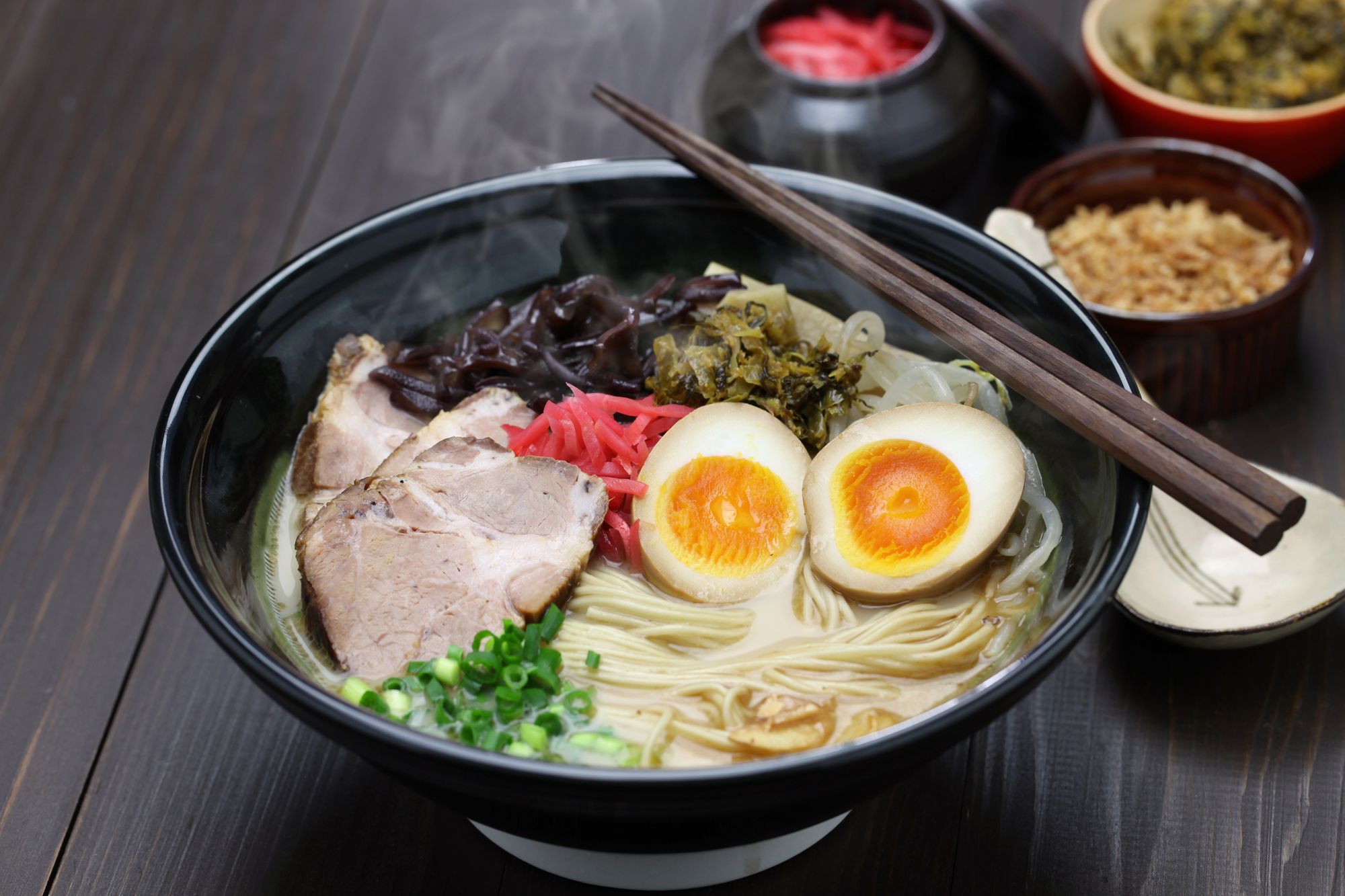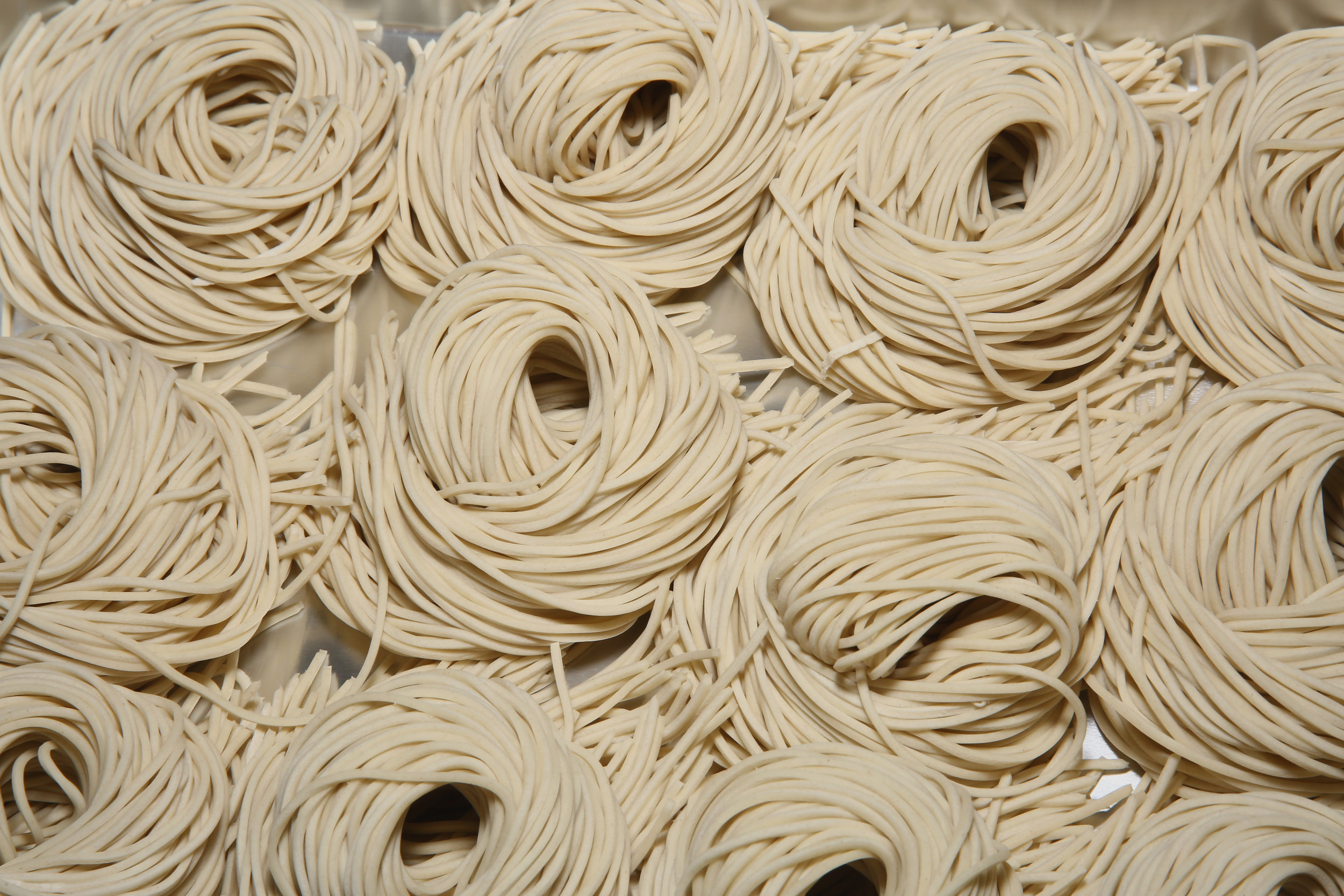Are you truly safe while enjoying your favorite bowl of ramen? The stark reality is that ramen listeria poses a grave threat, a silent danger lurking within a seemingly harmless meal, with the potential to unleash severe illness and even death.
Listeriosis, the infection triggered by the insidious bacteria Listeria monocytogenes, manifests with a range of debilitating symptoms, from fever and muscle aches to nausea, vomiting, and relentless diarrhea. In the most harrowing scenarios, it escalates to sepsis, meningitis, and tragically, death. Those with weakened defenses pregnant women, newborns, the elderly, and individuals with compromised immune systems stand on the front lines, facing the greatest risk of severe illness from this infection.
To understand the gravity of the situation, consider the characteristics of the culprit behind this threat Listeria monocytogenes.
- Neopolis Kokapet Sez Photos Your Ultimate Guide To Capturing The Magic
- Jurnee Lane Rising Star Of The Music World
| Characteristic | Description |
|---|---|
| Type | Gram-positive bacterium |
| Habitat | Soil, water, vegetation, and animal intestines |
| Disease | Listeriosis (foodborne illness) |
| High-Risk Foods | Unpasteurized milk, soft cheeses, deli meats, raw vegetables, and ramen noodles |
| Symptoms | Fever, muscle aches, nausea, vomiting, diarrhea, meningitis, sepsis |
| Prevention | Cook food thoroughly, practice good hygiene, proper food storage |
| Reference | For more information, visit the Centers for Disease Control and Prevention (CDC). |
Ramen noodles, a staple for many, especially students and budget-conscious individuals, have been implicated in numerous listeriosis outbreaks in recent years. The 2018 outbreak linked to Maruchan ramen noodles, which sickened ten people and claimed one life, serves as a chilling reminder of the potential dangers lurking within this seemingly simple meal.
For those concerned about the potential risks of listeriosis, a few simple precautions can significantly reduce your risk:
- Ensure ramen noodles are cooked thoroughly before consumption.
- Avoid eating raw or undercooked ramen noodles.
- Practice diligent handwashing after handling ramen noodles.
- Store ramen noodles in a cool, dry environment.
By integrating these simple yet crucial steps into your routine, you can substantially minimize the threat of listeriosis.
- Mansion Nail Lounge Photos Where Luxury Meets Nail Art
- Runway Gardens Your Ultimate Guide To Stunning Landscapes And Design Ideas
Ramen listeria remains a significant public health concern, capable of triggering severe illness and death. This threat stems from the bacteria Listeria monocytogenes, which can infiltrate various food products, including the ever-popular ramen noodles. To empower you with knowledge and safeguard your health, here are six critical aspects of ramen listeria that demand your attention:
- Bacteria:Listeria monocytogenes is a formidable bacterium that can unleash listeriosis, a severe infection capable of wreaking havoc on the brain, blood, and other vital organs.
- Foodborne illness: Listeriosis is classified as a foodborne illness, meaning it arises from the consumption of contaminated food. Ramen noodles have been identified as a common culprit in Listeria contamination.
- Symptoms: The symptoms of listeriosis can range from fever, muscle aches, nausea, vomiting, and diarrhea to, in severe instances, sepsis, meningitis, and even death.
- Prevention: Implementing preventative measures is paramount. These include thoroughly cooking ramen noodles, diligently washing hands after handling them, and ensuring they are stored in a cool, dry environment.
- Outbreaks: Numerous listeriosis outbreaks have been traced back to ramen noodles in recent years, underscoring the need for vigilance. The 2018 outbreak involving Maruchan ramen noodles, which led to ten illnesses and one fatality, serves as a stark warning.
- High-risk groups: Certain populations face a heightened risk of severe illness from listeriosis. These include pregnant women, newborns, the elderly, and individuals with compromised immune systems.
Ramen listeria presents a serious challenge to public health, but it is a challenge that can be overcome through informed action. By embracing simple preventative measures, such as thorough cooking, diligent handwashing, and proper storage, you can significantly reduce your risk of contracting this potentially devastating infection.
Listeria monocytogenes, the Gram-positive, facultative intracellular bacterium, is the causative agent behind listeriosis. This bacterium is ubiquitous, thriving in soil, water, vegetation, and even the intestines of animals and humans. Its prevalence makes it a significant contributor to foodborne illnesses, posing a particular threat to individuals with weakened immune systems.
- Transmission: The primary route of transmission for Listeria monocytogenes is through the consumption of contaminated food. Foods commonly implicated in Listeria contamination include unpasteurized milk, soft cheeses, deli meats, and raw vegetables. Transmission can also occur through close personal contact, although this is less frequent.
- Symptoms: The symptoms of listeriosis are diverse and depend on the severity of the infection. Mild cases may manifest as fever, muscle aches, nausea, vomiting, and diarrhea. More severe cases can lead to meningitis, encephalitis, and sepsis, with potentially fatal outcomes for those with compromised immune systems.
- Treatment: Listeriosis is typically treated with antibiotics, with the specific antibiotic regimen tailored to the severity of the infection. Severe cases may necessitate hospitalization to provide intensive care and monitoring.
- Prevention: Proactive prevention is key to mitigating the risk of listeriosis. Effective preventative measures include:
- Consuming only pasteurized milk and cheese products.
- Avoiding deli meats and raw vegetables, particularly if you are in a high-risk group.
- Ensuring meat is cooked thoroughly to kill any potential bacteria.
- Maintaining impeccable hand hygiene, especially after handling food.
- Adhering to proper food refrigeration guidelines to inhibit bacterial growth.
Listeriosis remains a significant health threat, but it is a threat that can be managed through knowledge and diligent action. By implementing these preventative steps, you can safeguard yourself and your family from this potentially life-threatening disease.
Listeriosis, the serious infection resulting from contaminated food consumption, frequently finds its way into the spotlight due to outbreaks linked to seemingly innocuous items like ramen noodles. In recent years, the prevalence of Listeria contamination in ramen has raised considerable concern.
- How Listeria contaminates ramen noodles:Listeria contamination can occur at any stage of the ramen noodle production process. It may be present in the raw ingredients, such as flour or eggs, or introduced during processing or packaging. Improper storage practices can also foster the growth of Listeria on ramen noodles.
- Symptoms of listeriosis: The symptoms of listeriosis can vary, ranging from mild to severe. Milder symptoms include fever, muscle aches, nausea, vomiting, and diarrhea. Severe cases can result in meningitis, encephalitis, and sepsis, with potentially fatal consequences, especially for individuals with weakened immune systems.
- Prevention of listeriosis: Preventing listeriosis involves a multi-faceted approach:
- Consume only pasteurized milk and cheese products to eliminate the risk of Listeria contamination.
- Exercise caution with deli meats and raw vegetables, as they are common sources of Listeria.
- Cook meat thoroughly to eliminate any potential bacteria that may be present.
- Maintain meticulous hand hygiene, especially after handling food, to prevent the spread of bacteria.
- Adhere to proper food refrigeration practices to inhibit bacterial growth and prevent contamination.
Listeriosis is a serious infection that demands vigilance and proactive prevention. By implementing these simple steps, you can help to protect yourself and your loved ones from this potentially life-threatening disease.
Listeriosis, the serious infection resulting from consuming contaminated food, including ramen noodles, presents a significant health risk. The symptoms of listeriosis can vary depending on the severity of the infection, ranging from mild discomfort to life-threatening complications.
Mild symptoms may include fever, muscle aches, nausea, vomiting, and diarrhea, causing general discomfort and disruption of daily activities. Severe symptoms, on the other hand, can lead to meningitis, encephalitis, and sepsis, posing a direct threat to life, particularly for individuals with weakened immune systems.
The association between ramen noodles and listeriosis outbreaks in recent years underscores the importance of awareness and prevention. The 2018 outbreak linked to Maruchan ramen noodles, which sickened ten individuals and resulted in one fatality, serves as a stark reminder of the potential dangers. This outbreak was traced back to a contaminated processing facility, highlighting the vulnerabilities in food production and safety protocols.
Given the potential severity of listeriosis and the known association with ramen noodles, being aware of the symptoms is crucial, especially if you have consumed ramen noodles recently. Experiencing any of the symptoms warrants immediate medical attention.
Preventing listeriosis involves a comprehensive approach encompassing various strategies:
- Opt for pasteurized milk and cheese products, as pasteurization effectively eliminates Listeria bacteria.
- Limit consumption of deli meats and raw vegetables, as these items are often implicated in Listeria outbreaks.
- Thoroughly cook meat to ensure the destruction of any potentially harmful bacteria.
- Maintain meticulous hand hygiene, especially after handling food, to prevent the spread of bacteria.
- Adhere to proper food refrigeration guidelines to inhibit bacterial growth and maintain food safety.
By diligently following these preventive measures, you can significantly reduce your risk of contracting listeriosis and protect yourself and your family from this serious infection.
Preventing listeriosis, the serious infection caused by contaminated food such as ramen noodles, demands a proactive approach. Outbreaks linked to ramen noodles in recent years, including the 2018 incident involving Maruchan ramen noodles that sickened ten and killed one, underscore the need for vigilance. The investigation traced the outbreak to a contaminated processing facility, highlighting potential vulnerabilities in the food supply chain.
The cornerstone of listeriosis prevention lies in adopting simple yet effective practices:
- Cook ramen noodles thoroughly to an internal temperature of 165 degrees Fahrenheit. This critical step eliminates Listeria monocytogenes, the bacterium responsible for listeriosis.
- Practice diligent handwashing after handling ramen noodles. Listeria monocytogenes can spread through close contact, making hand hygiene paramount in preventing transmission.
- Store ramen noodles in a cool, dry environment to inhibit the growth of Listeria monocytogenes, which thrives in warm, moist conditions.
By adhering to these fundamental steps, you can significantly reduce your risk of listeriosis and safeguard the health of yourself and your family.
Complementing these essential practices, consider these additional measures to further minimize your risk:
- Avoid consuming raw or undercooked meat, poultry, or seafood, as these items can harbor Listeria monocytogenes.
- Thoroughly wash fruits and vegetables before consumption to remove any potential contaminants.
- Opt for pasteurized milk and cheese to eliminate the risk of Listeria contamination.
- Regularly clean and disinfect surfaces that come into contact with food to prevent the spread of bacteria.
While listeriosis presents a serious health concern, it is largely preventable through diligent adherence to simple safety measures. By prioritizing these practices, you can significantly reduce your risk and protect yourself and your loved ones from this potentially life-threatening disease.
The connection between ramen noodles and listeria is a serious public health concern, as Listeria, a bacterium that can cause listeriosis, a potentially fatal infection. In recent years, ramen noodles have been linked to several outbreaks of listeriosis, including the 2018 outbreak that sickened 10 people and killed one.
- Contamination: Ramen noodles can become contaminated with listeria at any point during the production process. Listeria can be present in the raw ingredients, such as flour or eggs, or it can be introduced during processing or packaging. Listeria can also grow on ramen noodles if they are not stored properly.
- Symptoms: Listeriosis can cause a variety of symptoms, including fever, muscle aches, nausea, vomiting, and diarrhea. In severe cases, it can lead to meningitis, encephalitis, and sepsis. Listeriosis can be fatal in people with weakened immune systems.
- Outbreaks: There have been several outbreaks of listeriosis linked to ramen noodles in recent years. The most recent outbreak occurred in 2018 and was linked to Maruchan ramen noodles. The outbreak sickened 10 people and killed one person. The outbreak was traced back to a contaminated processing facility.
- Prevention: There are a number of things that can be done to prevent listeriosis, including:
- Eating only pasteurized milk and cheese
- Avoiding deli meats and raw vegetables
- Cooking meat thoroughly
- Washing hands thoroughly after handling food
- Keeping food refrigerated
If you experience any of the symptoms of listeriosis, it is important to see a doctor right away. Listeriosis can be a serious infection, but it can be treated with antibiotics if it is diagnosed early.
Introduction:
Listeriosis is a serious infection that can be caused by eating contaminated food, including ramen noodles. Pregnant women, newborns, the elderly, and people with weakened immune systems are at highest risk for severe illness from listeriosis.
- Pregnancy:
Pregnant women are at increased risk for listeriosis because their immune systems are suppressed during pregnancy. Listeria can cross the placenta and infect the fetus, leading to miscarriage, stillbirth, or premature birth. Newborns are also at increased risk for listeriosis because their immune systems are not fully developed.
- Age:
The elderly are at increased risk for listeriosis because their immune systems weaken with age. Listeria can cause serious infections in the elderly, such as meningitis and sepsis.
- Weakened immune systems:
People with weakened immune systems are at increased risk for listeriosis because their bodies are less able to fight off infection. Listeria can cause serious infections in people with weakened immune systems, such as cancer patients, transplant recipients, and people with HIV/AIDS.
Conclusion:
It is important for high-risk groups to be aware of the risks of listeriosis and to take steps to prevent infection. These steps include avoiding raw or undercooked meat, poultry, and seafood; washing fruits and vegetables thoroughly before eating them; and pasteurizing milk and cheese before consuming them.
Ramen listeria is a serious public health concern that can lead to severe illness and even death. Here are some frequently asked questions about ramen listeria:
Question 1: What is ramen listeria?
Answer: Ramen listeria is a type of bacteria that can cause listeriosis, a serious infection that can affect the brain, blood, and other organs.
Question 2: How can I prevent ramen listeria?
Answer: There are a few things you can do to prevent ramen listeria, including cooking ramen noodles thoroughly, washing your hands thoroughly after handling ramen noodles, and storing ramen noodles in a cool, dry place.
Question 3: What are the symptoms of ramen listeria?
Answer: Symptoms of ramen listeria can include fever, muscle aches, nausea, vomiting, and diarrhea. In severe cases, it can lead to sepsis, meningitis, and even death.
Question 4: Who is at highest risk for ramen listeria?
Answer: Pregnant women, newborns, the elderly, and people with weakened immune systems are at highest risk for severe illness from ramen listeria.
Question 5: What should I do if I think I have ramen listeria?
Answer: If you think you have ramen listeria, it is important to see a doctor right away. Listeriosis can be a serious infection, but it can be treated with antibiotics if it is diagnosed early.
Question 6: How can I stay up-to-date on the latest information about ramen listeria?
Answer: You can stay up-to-date on the latest information about ramen listeria by visiting the Centers for Disease Control and Prevention (CDC) website.
Summary of key takeaways or final thought:
Ramen listeria is a serious public health concern, but it can be prevented by following a few simple steps. By cooking ramen noodles thoroughly, washing your hands thoroughly after handling ramen noodles, and storing ramen noodles in a cool, dry place, you can help to protect yourself and your family from this potentially fatal disease.
Transition to the next article section:
For more information about ramen listeria, please visit the CDC website.
Ramen listeria is a serious public health concern that can lead to severe illness and even death. It is important to be aware of the risks of ramen listeria and to take steps to prevent infection. These steps include cooking ramen noodles thoroughly, washing your hands thoroughly after handling ramen noodles, and storing ramen noodles in a cool, dry place. Pregnant women, newborns, the elderly, and people with weakened immune systems are at highest risk for severe illness from ramen listeria. If you think you have ramen listeria, it is important to see a doctor right away.
Listeriosis is a serious infection, but it can be treated with antibiotics if it is diagnosed early. By following the steps outlined in this article, you can help to protect yourself and your family from ramen listeria.
- Unveiling The Secrets Of Aeligoeligcirc Eacuteyumlsup3 Ccedil382sup3 A Deep Dive Into The Phenomenon You Need To Know
- Evan Toretto Li The Rising Star Of The Fast Amp Furious Franchise


